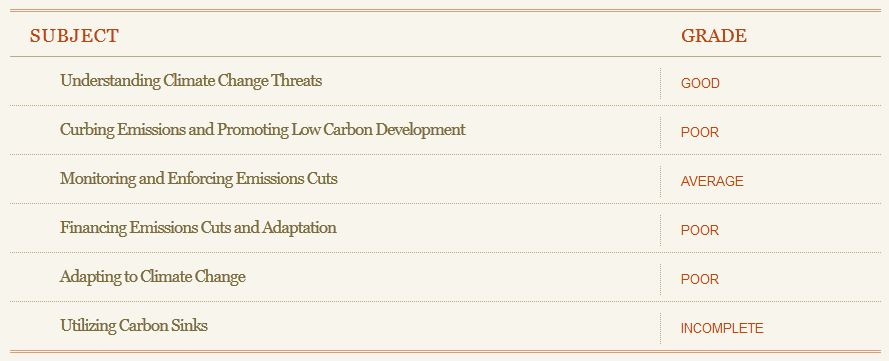Happy Earth Day! CFR Releases Global Governance Report Card on Climate Change

More on:
Happy Earth Day! Today marks its forty-third anniversary. The idea for the first Earth Day came from Senator Gaylord Nelson (D-WI). Appalled by the tragic 1969 oil spill near Santa Barbara, California, he wanted a way to bring attention to the problem of environmental degradation. His initial 1970 effort turned out 20 million people across the United States. Four-plus decades later, some one billion people around the world are participating in activities ranging from cleaning up parks and beaches to an environmental flash-mob in Seoul, which turned Psy’s “Gangnam Style” into “Eco-Style.”
So how are we doing at protecting the Earth? According to my colleagues in CFR’s International Institutions and Global Governance Program (IIGG), not well at all. They celebrated Earth Day by releasing a Global Governance Report Card on climate change. They give the international fight against greenhouse gas emissions a D. Here is how they broke the grade down among various elements of the climate change issue:
A few countries and organizations received some praise. IIGG deemed the World Bank and the European Union to be “leaders,” and gave Australia a nod as “most improved.” But the rest of the class came in for criticism. China and the United States were marked down as “laggards,” Russia was designated a “truant,” and Canada was earmarked for “detention.” Like any good grader, IIGG did more than just hand out grades and labels. It also provided detailed explanations of the why the grades are so low, and it identified what countries need to do to make a dent in climate change.
If you like grades, you should know that IIGG today released Global Governance Report Cards on five other global challenges: nuclear weapons proliferation; transnational terrorism; violent conflict; financial instability; and threats to global health. The purpose of the effort is to think systematically about whether countries and international institutions are doing what needs to be done to tackle the significant transnational challenges that the world faces.
More on:
 Online Store
Online Store
